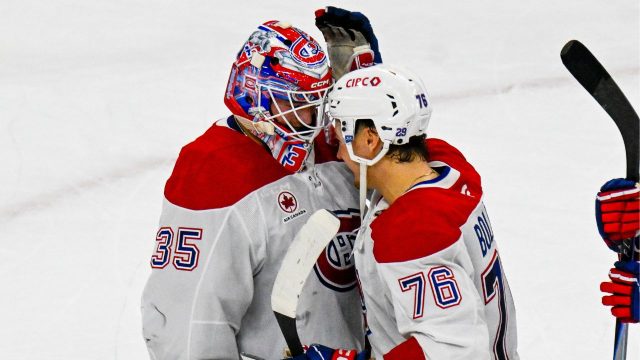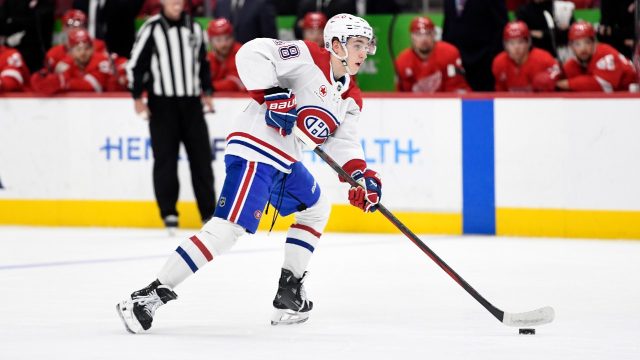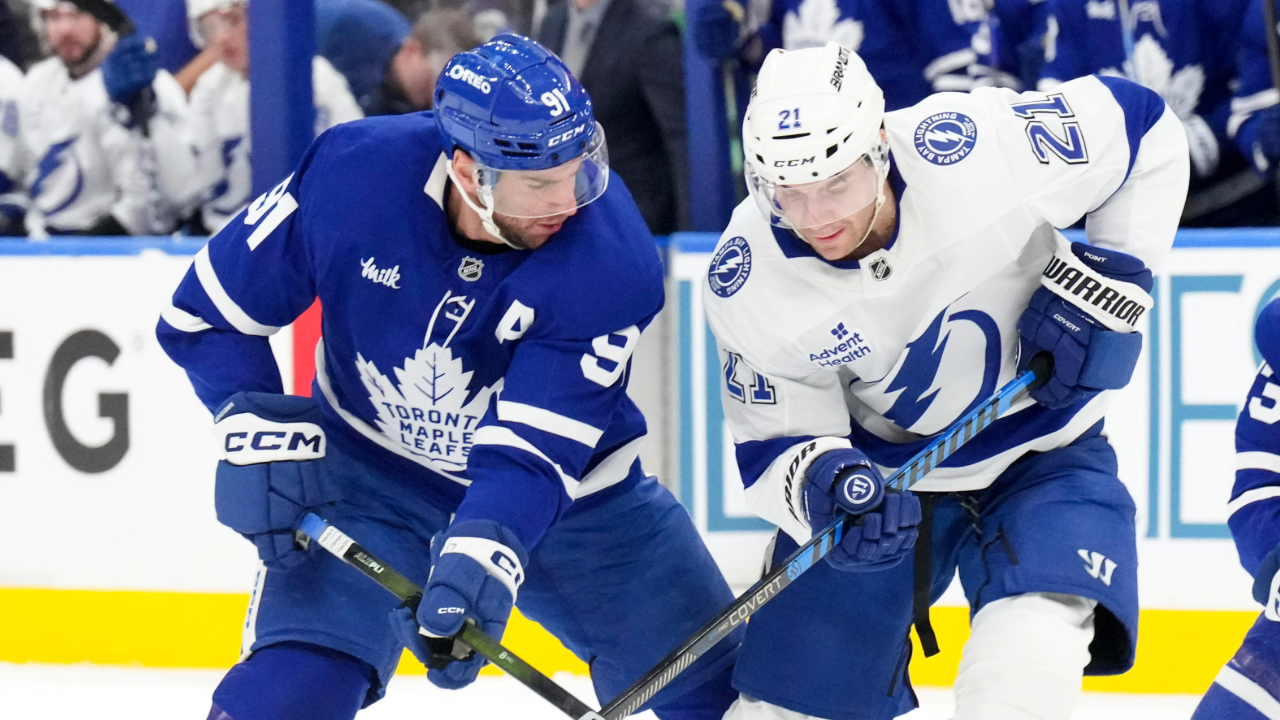
BROSSARD, Que.— Lane Hutson disarmed a nuclear negotiation to sign an eight-year, $70.8-million contract with the Montreal Canadiens Monday.
The 21-year-old was offered $72 million over the same term but opted to take a bit less because he cares more about the opportunity to win than he does his cap hit.
Still, starting in 2026, Hutson’s bank statement is going to massively appreciate. He’ll earn $11 million as soon as his entry-level contract expires at the end of June and his new deal begins in July, and that’ll kickstart years of signing-bonus payments that, coupled with a retirement compensation agreement, will ultimately net him more money than an eight-year deal paying him $9 million per season would’ve.
But that’s the fine print here.
The big story is Huston and the Canadiens both committing to preserving a culture that they hope will get them what they all want in the end: their best chance of competing for the Stanley Cup year after year.
Canadiens captain Nick Suzuki referred to that culture as “special” on Monday.
He helped craft it by becoming the first in a long line of players to take a team-friendly deal coming out of his entry-level contract, and Hutson’s decision — which was made on Saturday and officialized on Monday — likely helped ensure other players coming up through Montreal’s system will do the same.
For this, and for other reasons, executive vice president of hockey operations Jeff Gorton and general manager Kent Hughes had no pause about committing eight years to Hutson.
They held their ground on the financial end of it, using the leverage they had. With Hutson still three years away from having arbitration rights, and with him not being able to sign an offer sheet upon the expiration of his current contract, it was firmly in their favour to keep the cap figure reasonable—and they did.
Hutson’s camp pushed for more. With the salary cap expected to jump from $95.5 million this season to as much as $113.5 million for the 2027-28 season, and with other restricted free agents signing goal-post-moving deals (like the one Luke Hughes penned Oct. 1 for $63 million over seven seasons with the New Jersey Devils), they had reason to.
But as Hughes said Monday, “When the salary cap changes, the numbers change but the principles remain the same,” and he and Gorton stuck to those principles to convince Hutson he’d ultimately get what he wanted most by signing the deal that was on the table for him.
They knew what Hutson wanted most because the player’s desire was also expressed in that conversation, which helped diffuse what had become a heated standoff.
The temperature was turned up by negotiations spilling into the public sphere, and, with that, intentions got partially distorted.
Hutson wished to make sure his were clear to the Canadiens. He had long maintained that his priority was to sign with them, and he reaffirmed that when he talked to management Saturday.
When asked on Monday what message he aimed to send, Hutson responded, “That I had belief that we aren’t far off from being a team that can be a Stanley Cup championship team. And not just once; hopefully we continue to do it. Just the belief I have in this group and the staff, the coaches, everything we have in place, I think we’re headed in a great direction.”
It is a direction that could’ve been altered by this negotiation potentially going from ugly to hideous, and by it dragging on any longer.
If Hughes didn’t feel that way, he wouldn’t have said, “I think it’s fair to say it would have an effect on Lane and the team.”
The GM added he’d hoped to avoid that outcome prior to the season and noted the deal did come three games later than he and Gorton intended for it to.
Hutson said it was all but concluded before he played the third game, though his play suggested he’d have preferred for it to be finalized before he even played one.
“I didn’t feel good in any of them,” the Michigander, who was raised in Chicago, said.
“Haven’t had my best yet,” Hutson added, “but feel confident in what I can do.”
The Canadiens feel confident about what Hutson can do as well.
They have since before they drafted him 62nd overall in 2022.
As Hughes mentioned, they were elated to get him that late. He didn’t have to say they were thrilled to watch him rewrite NHL history en route to a remarkable 66-point rookie campaign that earned him the Calder Trophy.
It was a huge factor in the Canadiens unexpectedly making the 2025 playoffs, and the commitment Hutson made Monday will render him a huge factor in any future success the team enjoys.
Martin St. Louis knows.
“He’s a gamer,” the coach said. “He wants to be the difference, and not just offensively. He’s hard on himself defensively. His compete level, that’s contagious.”
Yes, Hutson’s on-ice influence on his teammates has been obvious.
But the decision he made off the ice Monday could be even more influential.
If that wasn’t obvious enough already, it will be by next summer, when Ivan Demidov is a year away from completing his entry-level deal and entering negotiations that could lead him to a new long-term contract with the Canadiens.
As Hughes put it, Hutson’s deal enables the team to “continue to keep other young players that we think will be part of it.”
He also pointed out it helps the Canadiens “add where we think there’s an opportunity, as there was this summer with Noah Dobson.”
Dobson was a year away from unrestricted free agency, unsigned, and holding all the leverage to ask the New York Islanders for an $11-million cap hit over eight years, but he settled for $9.5 million per year over eight years with the Canadiens after they traded for him.
Gorton and Hughes paid Dobson as much because, as Hughes said Monday, “The reality is if you go into the open market, you’re gonna have to pay.”
He added he’d rather build from the inside as much as possible before saying he won’t hesitate to reach outside when he needs to.
“When you have a young group of players that are committed to this team, I think we owe it to them that if we believe there’s a hole in the lineup that’s needed to be filled in order to have a championship-calibre team, then we’re going to need to do that,” Hughes concluded.
The business he got done with Hutson not only further enables him; it incentivizes him.
In the end, that was more important to Hutson than the money.
He could’ve taken more on the cap Monday. Or he could’ve not taken anything at all and waited, betting on himself and holding out for more next fall — when the Canadiens would need him playing rather than sitting on the sidelines without a contract.
That would’ve had the opposite effect of cooling the white-hot heat around this situation.
Hutson understood that and opted to put the whole thing on ice, likely giving himself and the Canadiens the best chance at getting what they both want most: multiple chances to win together.






